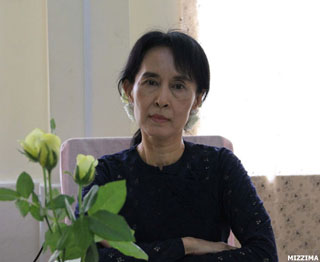(Mizzima) – Denouncing violence and encouraging understanding and respect, Burmese opposition leader Aung San Suu Kyi told a U.S. university audience, “There can be no peace without democracy, and no democracy without peace.”
 Speaking via a recording to an estimated crowd of 500 on the campus of the University of Michigan on Wednesday, Suu Kyi accepted the Raoul Wallenberg Award in recognition of her individual courage and dedication to nonviolent means in fighting for humanitarian ideals.
Speaking via a recording to an estimated crowd of 500 on the campus of the University of Michigan on Wednesday, Suu Kyi accepted the Raoul Wallenberg Award in recognition of her individual courage and dedication to nonviolent means in fighting for humanitarian ideals.
Raoul Wallenberg is celebrated for his role in saving the lives of tens of thousands of Jews in Nazi-occupied Hungary while serving as Sweden’s special envoy to Budapest. Prior to World War II, he studied architecture at the University of Michigan.
Paying homage to Wallenberg’s legacy, Suu Kyi said, “Where there are no laws and institutions to protect basic human rights, individuals have to fall back on their own will to practice and promote the freedoms in which they believe.”
In addressing the prospects for ending Burma’s decades-long civil wars, the Nobel Peace laureate acknowledged the just grievances of ethnic communities. She said Burmans, as the majority group in the country, inherit a duty to demonstrate broadmindedness and understanding when considering the position of ethnic minorities.
She also spoke of the need for self-empowerment. During remarks about the lack of trust in Burmese society, Suu Kyi called on individuals to look inside themselves and begin to trust in themselves as a means of laying the groundwork for trust in others.
One student said she found the question and answer session, made possible via Skype, to be particularly insightful.
Responding to a question, Suu Kyi related how she overcame her fear of the dark as a child by walking around and around in the dark. After two weeks of her ritual night walking she successfully pushed passed this barrier.
Fear, as has often been the case, was a common theme during Suu Kyi’s 30-minute talk. “Fear renders us dumb and passive,” she told her audience. “Fear paralyzes.” The Burmese opposition leader added, “Fear anywhere, in any language, belittles, negates and degrades.”
With the killing of former Libyan leader Muammar Gadaffi still fresh in people’s minds, Suu Kyi said, in denouncing execution as a political tool, that she prefers people with heads to those without.
Suu Kyi was the 21st recipient of the Wallenberg Award, following Archbishop Desmond Tutu (2008), Paul Rusesabagina (2005), the Dalai Lama (2004) and Elie Wiesel (1990).



